January | 2024
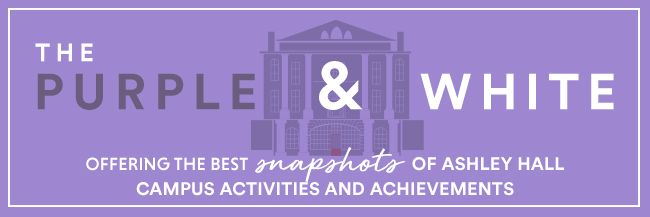
Stories and photos from Ashley Hall’s campus that highlight what students and faculty are achieving each month together.
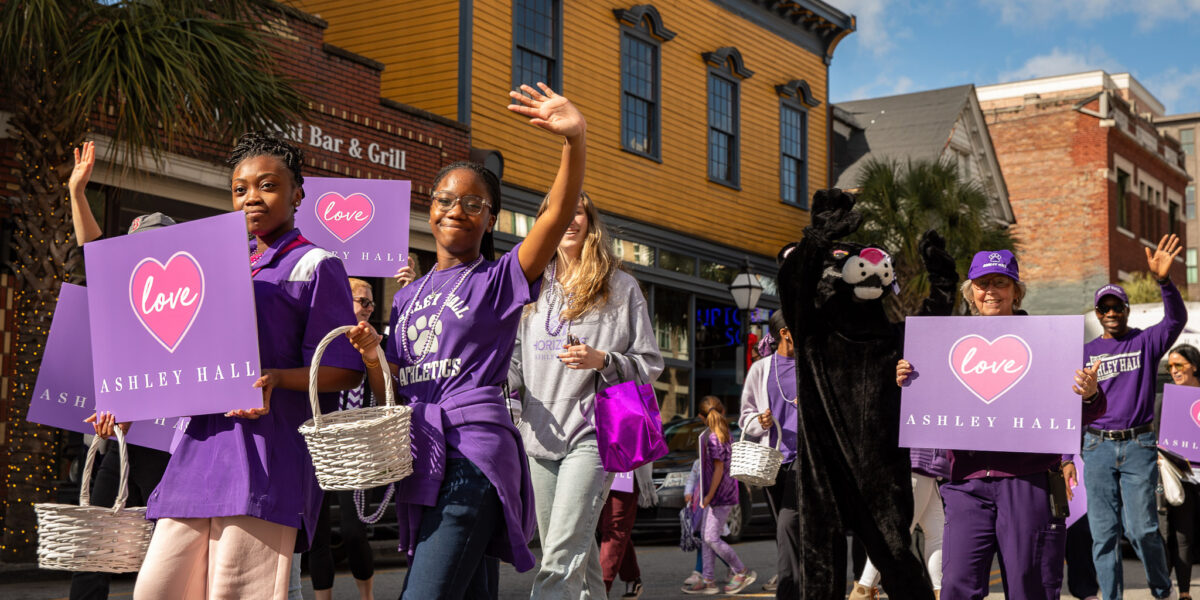
Celebrating Black History in the Classroom and as a Community
Black history is American history, and at Ashley Hall, it’s celebrated in a myriad of ways. Last month, 50 spirited members of our community, including students from every division, faculty, and parents, marched in Charleston’s annual Martin Luther King Jr. Day Parade. It was the largest group to march in recent history, and as we enter Black History Month, which begins today, educators are gearing up for a busy month filled with conversations about social justice, history, and belonging.
In Pardue Hall, the Lower School will honor Black History Month with a series of weekly student-led presentations during which each grade will take the stage to educate their peers on topics ranging from key civil rights moments in history to the power of peaceful protest. Across the sports court in the IP building, fifth grade classes will be collaborating to make a quilt detailing the stories of many influential Black Americans.
In the Upper School, juniors will be heading off campus to explore McLeod Plantation Historic Site as a part of their study of Reconstruction, the period during which the South was reincorporated back into the Union and freed people were granted the rights and privileges of full citizenship. “McLeod is an important local monument to the history of slavery and the story of emancipation,” explains U.S. history teacher John Nagler who will be leading students in this exploration off campus.
Students also have the opportunity to take part in two exciting student-led events focused on strengthening bonds in our diverse community in the coming months led by Assistant Head of School for Student Affairs Cintra Horn. On Friday, February 16, a group of students will travel to Savannah for the annual Lowcountry Student Diversity Conference, an initiative to bring young leaders together to promote diversity, equity, and inclusion (DEI). In March, Ashley Hall will also co-host a Student Leadership Summit on Belonging with Porter-Gaud. The summit will include students in grades 8-12 and focus on building community and developing leadership skills to enhance the sense of belonging at our schools.
LOWER SCHOOL
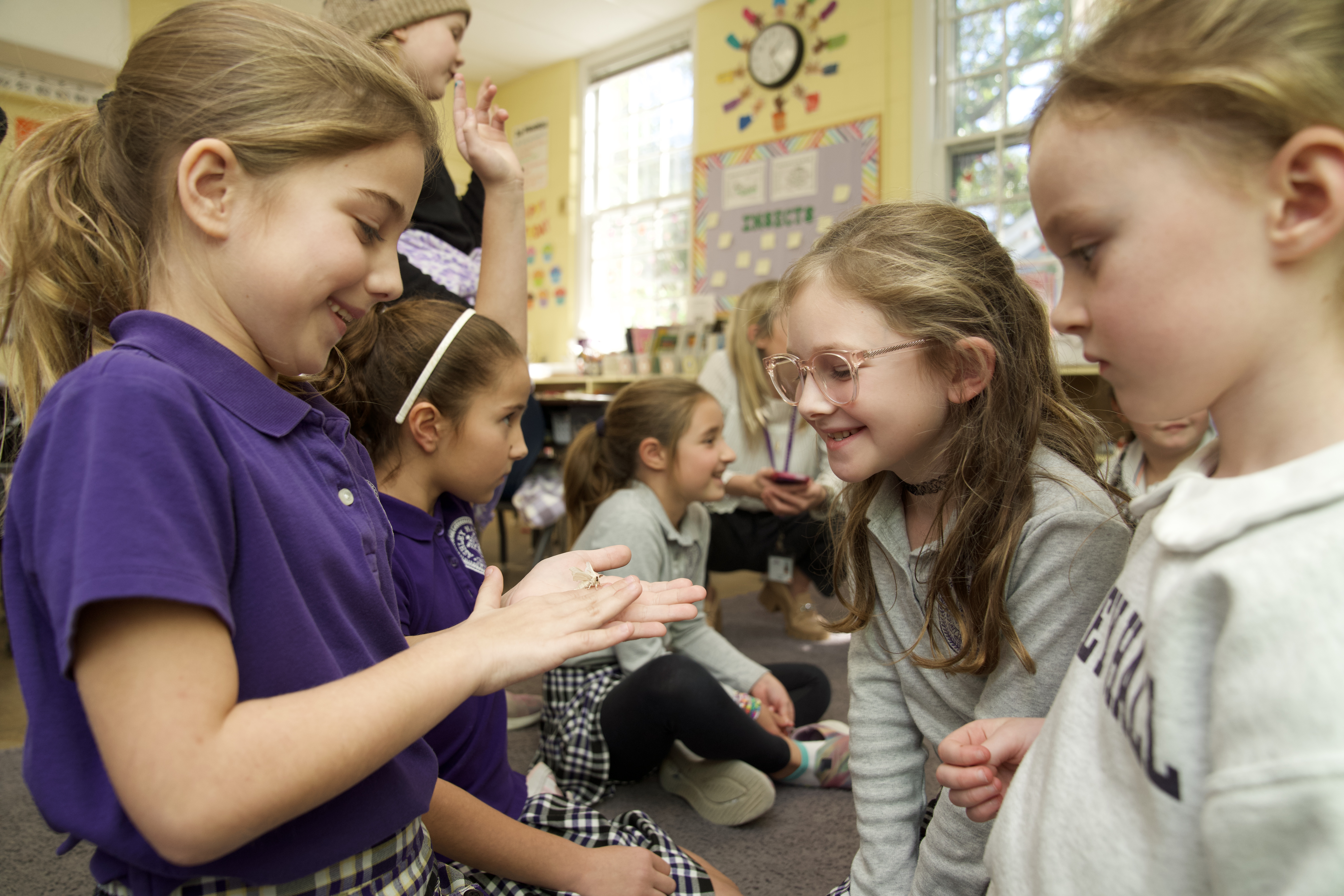
The Silkworm Diaries: Observing Insect Life Cycles in Second Grade
Second grade minds have been spinning for months thanks to a very special science project focused on tracking the life cycle of the silkworm. “We have been studying insects, including ladybugs, Painted Lady butterflies, and silkworms for our Primary Years Programme (PYP) unit Insect Detectives,” says Lower School faculty member Mary O’Donnell. “However, the silkworms have been our pride and joy. They have captured the attention from the girls – and all of Pardue Hall.”
With hand-held magnifying lenses, students started the project last semester by watching 10 tiny silkworms, each only about 2 millimeters in size, hatch from their eggs. “This is when the fun really began,” O’Donnell says. “We kept a silkworm journal, and each day, we would switch out the food and observe the silkworm’s growth. Then every few days, the girls would record their observations and draw a picture.” Here’s a snapshot of the amazing life cycle of the silkworm, seen through the eyes of her students:
The Larva Stage: Silkworms are in the larva stage for 20-30 days. “We had to keep our classroom as warm as possible, about 75 degrees, to help them grow,” O’Donnell says. “When the silkworms were big enough, the girls were able to hold them and feel how soft their skin was.” Over winter break, their worms tripled in size.
The Pupa Stage: On New Year’s Day, the first silkworm started to spin its cocoon. But this didn’t happen fast, explains Vivienne Allen ’34. “It took a whole night,” she says. “It was spinning, and that’s when we made a video.” O’Donnell set up a time-lapse video to capture the amazing 24-hour process of a silkworm creating its cocoon.
The Moth Stage: Sixteen days after spinning, the class’ first silkmoth emerged by creating a hole in its silk cocoon. “Once they are moths, they do not eat or fly because they cannot survive in the wild,” Alice Carrico ’34 explains. This made it easy for students to observe their moth up close. “Their feet stick to you so they can’t really get away, and their abdomen is really fluffy,” Carrico says.
DID YOU KNOW? | Silkworms are domesticated insects and bred only to lay eggs and produce silk. Most are killed in the pupa stage so that the silk thread they create can be kept intact. The lifespan of a silkmoth is only a short 5-10 days – just long enough for students to appreciate this little creature!
UPPER SCHOOL
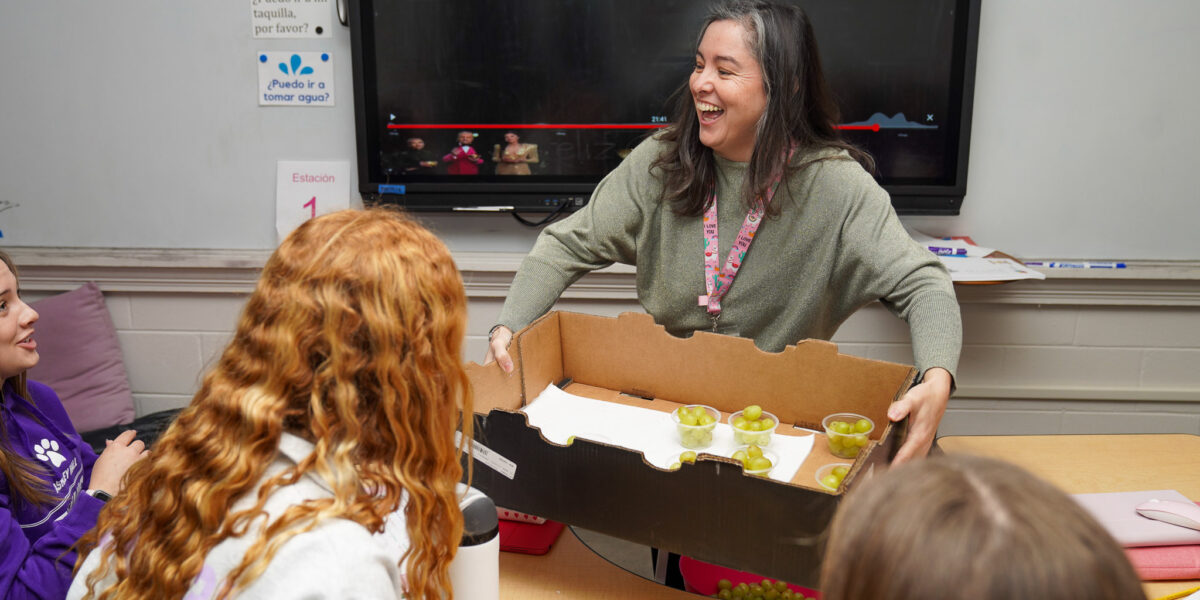
Students Explore Spanish Holiday Traditions – and Guarantee Good Luck for 2024!
If you thought the fun of celebrating the holidays was all said and done by the time classes resumed at Ashley Hall after the break this January, think again. Just ask Nautilus and Upper School students in Olga Long’s Spanish class.
“Gift-giving in Spanish-speaking countries is often celebrated a week after ours,” Long explains. “Three Kings’ Day or El Día de los Reyes Magos is a national holiday in Spain. It takes place on January 6, and the night before is akin to Christmas Eve.”
Students dove into learning La Navidad in December, along with its tradition of gift-giving. “In Spain traditionally, it’s the Kings, or Reyes, who receive letters from children and ‘deliver’ presents, not Santa Claus,” Long says. To work on their language skills – and get in touch with their inner child – students were tasked with choosing their favorite King, Melchor, Gaspar, or Baltasar, and writing them a letter to introduce themselves and make a few gift requests.
To cap off their unit exploring the history behind Hispanic holidays, on January 8 students took part in another tradition that happens every December 31 in Spanish households: las doce uvas de la suerte or the “twelve lucky grapes.” With a recording of the live 2024 New Year’s Eve broadcast in Madrid’s famous Puerta del Sol playing in the background – in Spanish of course – Long passed out tiny cups of green grapes to students and explained how the tradition works:
Just a few seconds before midnight, a ball over Puerta del Sol begins to lower, followed by the four bell chimes to warn you that the big moment is near. Then, for every one of the twelve clock chimes that ring in the new year at midnight, you must eat one grape. The goal is to finish all your grapes before the chimes finish ringing if you want good luck for the year!
UPPER SCHOOL
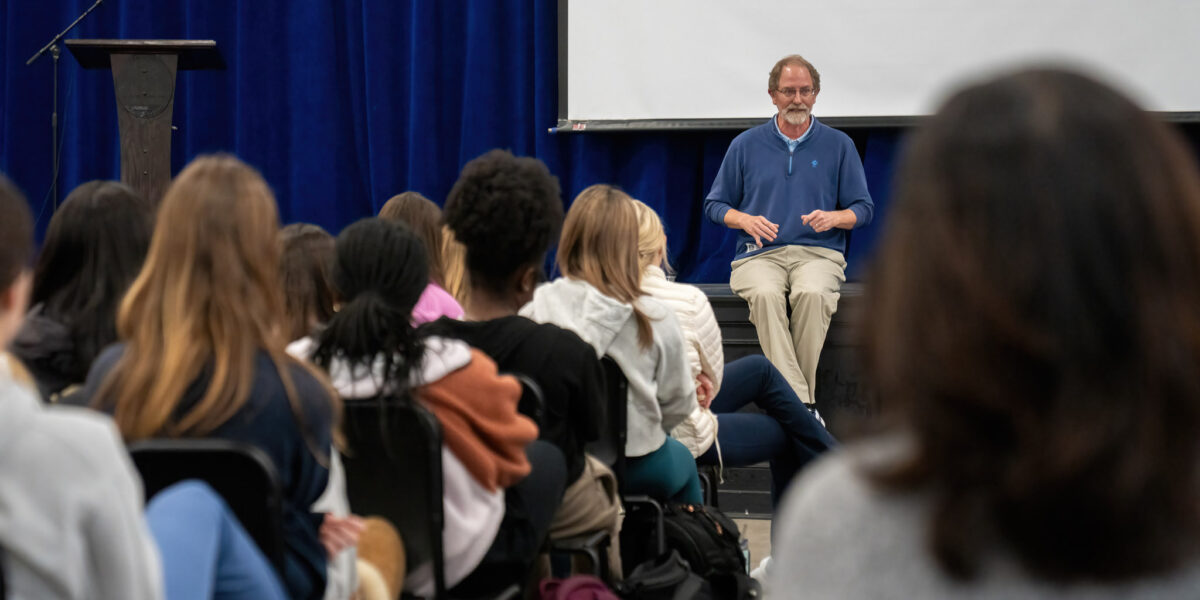
Wellness Programming Continues to Expand in the Upper School with Student Life Series
In 2010, Ashley Hall launched a new wellness program called the Personal Awareness and Wellness Seminar (PAWS). Since, the program, as well as the number of faculty and staff supporting it, has done nothing but grow.
“Historically, when the wellness program was developed, we only had a very small amount of time during monthly assemblies to get social-emotional programming to students on a regular basis,” explains Director of Counseling and Upper School Student Life Kelly Sumner who helped launch the PAWS program. Today, however, social-emotional programming for Upper School students is offered through both required courses, as well as through the Student Life Series, a set of yearlong assemblies for students in grades 9-12.
Each Student Life Series assembly features different age-appropriate speakers or activities that fall under the social-emotional, life skills, and college counseling umbrella. “This series allows us to dive a little bit deeper into a specific subject, then also bring in community professionals,” says Upper School faculty member and counselor for grades 9-12 Katie Neighbours. “Faculty members are involved in supporting our students, as well as Ashley Hall parents, community members, and even alumnae.”
Last month, the Student Life Series hosted Ashley Hall parent Wood Marchant who is the Director of Collegiate Recovery at the College of Charleston to share his knowledge of substance abuse and addiction with freshmen and juniors. At the same time across campus, Bank On, a city of Charleston program which offers free financial workshops, educated sophomores and seniors about budgeting, saving, and credit management.
In addition to speakers, the Student Life Series also features interactive experiences. “It allows us to do different things that aren’t conducive to a classroom environment,” Sumner says. For example, in February, the series will host a distracted driving event sponsored by the National Safety Council, Neighbours shares. “We’ll be closing off Smith Street so students in grades 10-12 can rotate through different activities related to driving safety.”
“This programming aims to offer crucial life skills to students every year of their high school experience, regardless of when they enroll in a wellness course. It also helps them stay connected to the counseling department so they know it’s always there for them.” – Director of Counseling and Upper School Student Life Kelly Sumner
PANTHER ATHLETICS
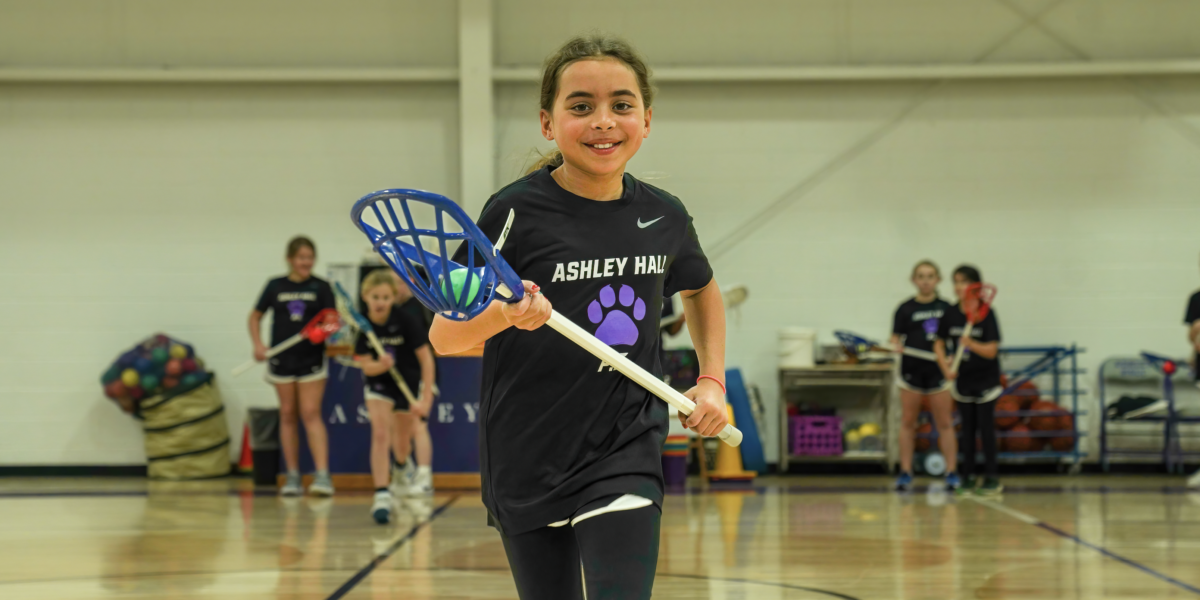
Ashley Hall Scoops Up Lacrosse Opportunity for Bantam and CUBS Athletes
This spring, Ashley Hall is joining a new rec-level youth lacrosse league in collaboration with South Carolina Youth Lacrosse – and there was a new face in the gym last month to let students know what it’s all about.
For two weeks in January, Director of Lacrosse at South Carolina Youth Lacrosse Taylor Blenckstone joined Panthers in grades 2-6 as a guest coach during P.E. class to share her love for lacrosse. “Young athletes are just so willing to learn, and they love to do new things,” Blenckstone says. “That’s why you start in P.E. I’ve found that every time a new kid gets a lacrosse stick in their hands, they’re hooked.”
From grip to cradling the ball with confidence, students spent the first few days learning the basics of lacrosse. Soon they were learning how to pass in three basic steps: step, release, and follow through. “Then in week two, I made it a little more fun and interactive,” Blenckstone says. “I wanted to see if they retained what we did and could apply it to certain drills and games.”
The verdict? The Panthers passed with flying colors. “Seeing them catch their first ball or get a really good pass and be excited about it, that means everything,” Blenckstone says. “That’s exactly why I’m doing what I’m doing – to see their excitement and see their engagement in something new and hopefully have them stick with it.”
Interesting in signing up your athlete to play this spring? Get more information on how to register here
FOOD FOR THOUGHT
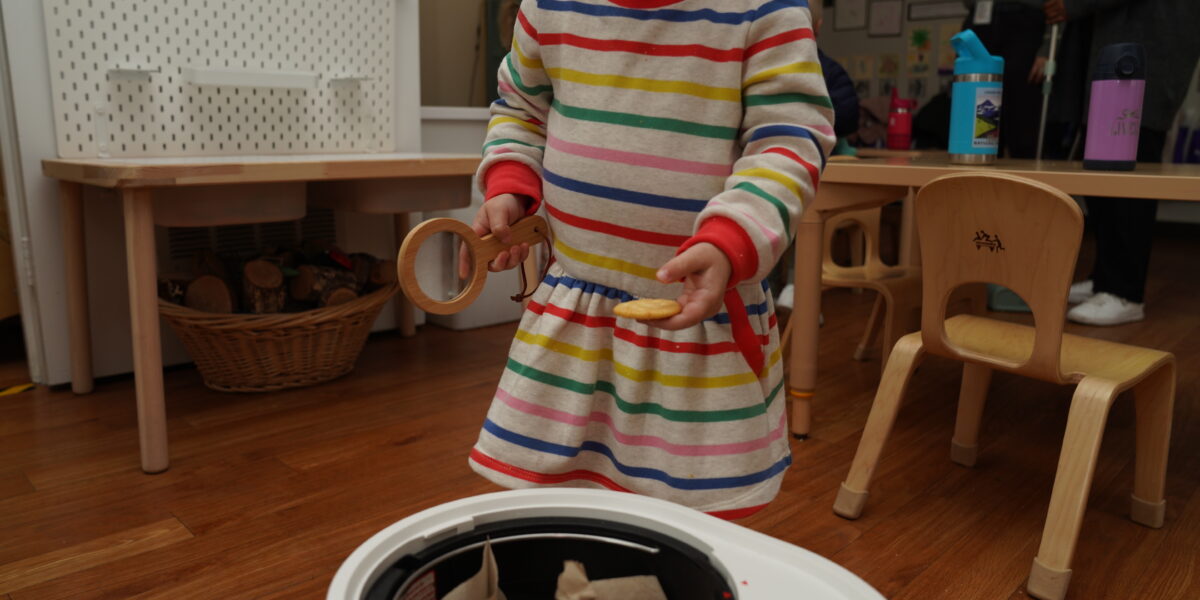
Early School Kicks Off the New Year with New Technology to Help Students Become Better Stewards of the Environment
There are shiny new robots running around the Ross Early Education Center. Yes, robots, and they’re feeding on orange peels, lunch scraps, and even napkins! Meet the Lomi, a countertop food composter that’s found its way into every Early School classroom as part of the School’s U.N. Sustainability Goal of Zero Hunger.
“Last semester, we began to have conversations with our students about what we can do to reduce our food waste,” says Early School faculty member Katie Harvard. “We started reading books about composting and where our food comes from and what it can become.”
After the holidays, her primary class, along with every other class in the Early School, returned to campus to find a special box waiting for them which contained their very own Lomi robot. “Through a grant, we were able to purchase a Lomi for each classroom,” says Early School naturalist and faculty member Rachael Carter. “Now, the Early School uses them daily to collect all of our food waste.”
So how does the process work? “After we eat snack and lunch, we put all of our food that we would have previously thrown away into our Lomi,” Harvard explains. “The children look through the skylight top to see how, when we push the button on the Lomi, it begins its job of grinding down our food into a hay-like substance that we can recycle into our outdoor garden.”
In a matter of hours, their food is transformed inside the Lomi. “We then can explore the contents and examine it closely using our sense of smell, touch, and sight,” Harvard says. After making their observations, sometimes with a microscope to look extra close at the new form their food waste has taken, students empty their Lomi into new composting bins that sit along the edge of their outdoor classroom. There, it’s mixed with soil to later be used in the Early School gardens.
“The process of composting nurtures our children to learn about the importance of the three environmental Rs: Reduce, Reuse, Recycle. We wonder how this will layer their critical-thinking skills to understand the significance of worms, insects, biodegradable items, and more to care for our earth.” – Early School Educators